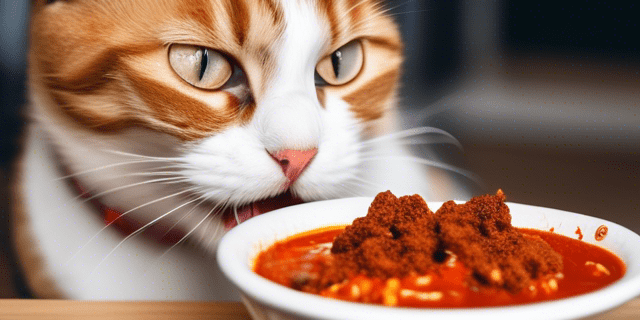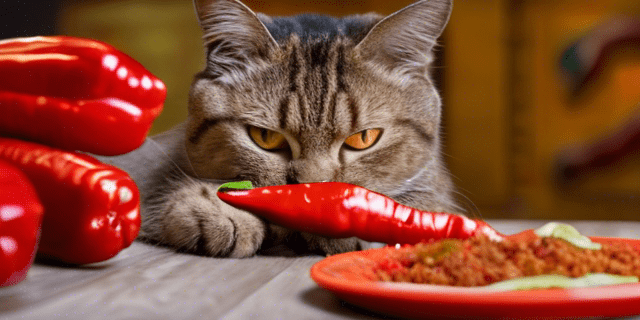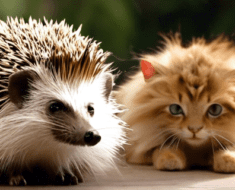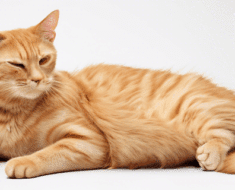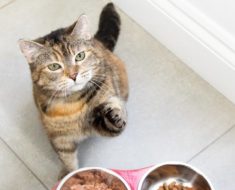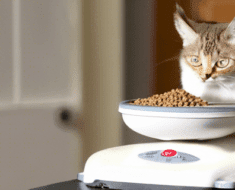Cats should not eat spicy food as it can upset their stomach and cause discomfort. Spices can be harmful to cats.
When it comes to feeding your feline friend, it’s crucial to be mindful of what foods are safe for them to consume. While cats may be curious about new flavors, spicy foods should not be on their menu. Cats have different dietary needs than humans and certain spices can be toxic to them.
It’s best to stick to a balanced diet of cat-specific foods to ensure your pet stays healthy and happy. We will explore why spicy foods are not suitable for cats and provide alternative options for your furry companion’s diet.

The Spicy Food Sensitivity In Cats
Spicy food can be harmful to cats as they lack the taste receptors for spice. It may lead to stomach upset, diarrhea, and discomfort. It’s best to stick to a feline-friendly diet to avoid any digestive issues or health concerns.
Feline Dietary Sensitivity
Cats have a sensitive digestive system that is not built for handling spicy foods. Spicy foods contain substances like capsaicin which can upset a cat’s stomach.
Impact Of Spicy Food On Cats
Consuming spicy food can lead to vomiting, diarrhea, or gastrointestinal upset in cats. Introducing spicy foods into a cat’s diet can lead to digestive distress.
Potential Health Risks
When it comes to the question of whether cats can eat spicy food, it’s essential to be aware of the potential health risks involved. Feeding spicy food to cats can lead to various issues that can negatively impact their health and well-being.
Digestive Issues
Cats have sensitive stomachs and digestive systems, spicy foods can cause upset stomachs, diarrhea, and vomiting in cats. Spices like chili peppers irritate their intestines leading to digestive discomfort.
Allergic Reactions
Some cats may be allergic to certain spicy ingredients, resulting in allergic reactions such as itching, swelling, and difficulty breathing. It’s essential to monitor your cat closely after feeding them spicy food.
Safe Alternative Foods For Cats
Cat-friendly Spices
Cats are sensitive to spicy foods due to their delicate digestive systems. However, certain cat-friendly spices can add a flavor boost to their meals without causing any harm. Cat-friendly spices such as turmeric, ginger, and cinnamon are safe for cats in small quantities. These spices not only enhance the taste of their food but also offer potential health benefits.
Nutritious Options
When it comes to incorporating safe alternative foods into a cat’s diet, it’s essential to prioritize nutritious options. Cats require a balanced diet to maintain optimal health, and it’s important to provide them with a variety of nutritious foods. Fresh fruits such as bananas and berries can be served as occasional treats, while cooked vegetables like carrots and green beans can offer essential vitamins and minerals.
Understanding Cats’ Dietary Needs
Cats’ digestive systems are not designed for spicy food, as it can cause stomach upset and discomfort. Feeding cats bland and mild food ensures their dietary needs are met without causing any health issues. Understanding cats’ preferences and limitations is key in providing them with a balanced and nutritious diet.
Carnivorous Diet
Cats are carnivores, meaning their diet primarily consists of meat. In the wild, cats would hunt and consume small prey like mice and birds, which are high in protein and low in carbohydrates. This natural diet has shaped their biology, making them biologically adapted to consume and digest animal-based foods. Unlike humans, cats are unable to produce certain nutrients themselves and must obtain them from animal sources. This is why it is crucial to understand their specific dietary needs in order to provide them with a balanced and healthy diet.
Balanced Nutritional Requirements
To ensure optimal health and longevity, cats require a diet that meets their balanced nutritional requirements. While they may enjoy the taste of various spices, it’s important to remember that spices are not a necessary part of a cat’s diet. Too much spice can actually be harmful to their delicate digestive systems.
Cats have a much more sensitive digestive system compared to humans, and certain spices can cause gastrointestinal distress, irritation, and potentially lead to more serious health issues. A good rule of thumb is to avoid feeding your cat any spicy foods and instead focus on providing them with a nutritionally balanced diet suited for their carnivorous nature. Below are some key nutritional requirements that should be taken into consideration when discussing a cat’s diet:
- Protein: Cats require a high amount of protein in their diet as it plays a vital role in maintaining their lean muscle mass and overall health. Animal-based proteins, such as chicken, fish, and meat, provide the necessary amino acids for proper growth and development.
- Fats: Fats are an essential source of energy for cats and aid in the absorption of certain vitamins. Cats need a moderate amount of fat in their diet to support a healthy coat and skin.
- Carbohydrates: While cats require a small amount of carbohydrates in their diet, they do not have the metabolic capacity to efficiently digest large quantities. Too many carbohydrates in their diet can lead to weight gain, diabetes, and other health issues.
- Vitamins and Minerals: Cats need a variety of vitamins and minerals for their overall well-being. These include but are not limited to vitamin A, vitamin B, vitamin E, calcium, and phosphorus. These essential nutrients help support their immune system, promote healthy bones, and aid in various bodily functions.
| Nutrient | Sources |
|---|---|
| Protein | Chicken, fish, lean meat |
| Fats | Salmon oil, chicken fat |
| Carbohydrates | Whole grains, vegetables |
| Vitamins and Minerals |
|
Introducing New Foods To Cats
Introducing new foods to cats can be an exciting process, but it’s important to approach it with caution. Cats have sensitive digestive systems, and certain foods can cause digestive upset or even be toxic to them. When it comes to spicy food, it’s best to exercise caution and limit their exposure to it. In this article, we will explore the topic of whether cats can eat spicy food and the best practices for introducing new foods to your feline friend.
Gradual Introduction
When introducing new foods to your cat, it’s essential to do it gradually. Cats are creatures of habit, and sudden changes to their diet can lead to stomach upset and refusal to eat. Start by offering a small amount of the new food alongside their regular diet. This allows them to acclimate to the new flavors and textures while minimizing the risk of digestive issues. Monitor your cat’s response to the new food.
Observe any signs of discomfort such as vomiting, diarrhea, or changes in behavior. If you notice any adverse reactions, it’s best to discontinue feeding that particular food and consult with your veterinarian. Slowly increase the amount of the new food over time. As your cat becomes more accustomed to the new food, you can gradually increase the portion size. This progression ensures that they have a chance to adjust to the flavors and allows their digestive system to adapt to the new diet.
Observing Behavioral Changes
Pay close attention to any behavioral changes in your cat when introducing new foods. Cats are individuals, and their preferences and tolerances may vary. Some cats may show enthusiasm for new flavors, while others may be more hesitant. Look for signs of excitement or aversion when introducing the new food. This can include increased sniffing, pawing at the food, or turning away from it.
Keep in mind that cats are obligate carnivores, meaning their diet primarily consists of meat. Ensure that any new food you introduce meets their nutritional needs. Consult with your veterinarian to ensure you are providing a balanced and appropriate diet for your feline companion. Remember, cats can be picky eaters. If your cat rejects a particular food, don’t force them to eat it. Instead, try offering different options that meet their dietary requirements.
Frequently Asked Questions Of Can Cats Eat Spicy Food
What Happens If Cats Eat Spicy Food?
Cats can have stomach upset if they eat spicy food, leading to vomiting or diarrhea. It’s best to avoid giving them spicy food.
What Spices Can Cats Eat?
Cats can eat small amounts of cat-safe spices such as basil, oregano, and parsley. These spices can provide some variety and flavor to their diet. However, it’s important to avoid giving cats spicy or toxic spices such as garlic, onion, and chili powder, which can be harmful to them.
Why Does My Cat Like Hot Cheetos?
Cats may be attracted to the smell or taste of hot Cheetos, but they shouldn’t eat them.
Do Cats Like Spicy Smells?
Cats generally do not like spicy smells. Their scent receptors are highly sensitive, and strong spicy smells can overwhelm and irritate their delicate nasal passages.
Can Cats Eat Spicy Food?
It is generally not recommended to feed cats spicy food as it can cause digestive issues and discomfort for them.
Conclusion
It’s best to avoid feeding spicy food to cats. Their sensitive stomachs may not handle it well. Opt for feline-friendly treats instead. Prioritize their health and well-being by sticking to a balanced diet. Always consult a vet for dietary advice and keep your furry friend safe and content.
